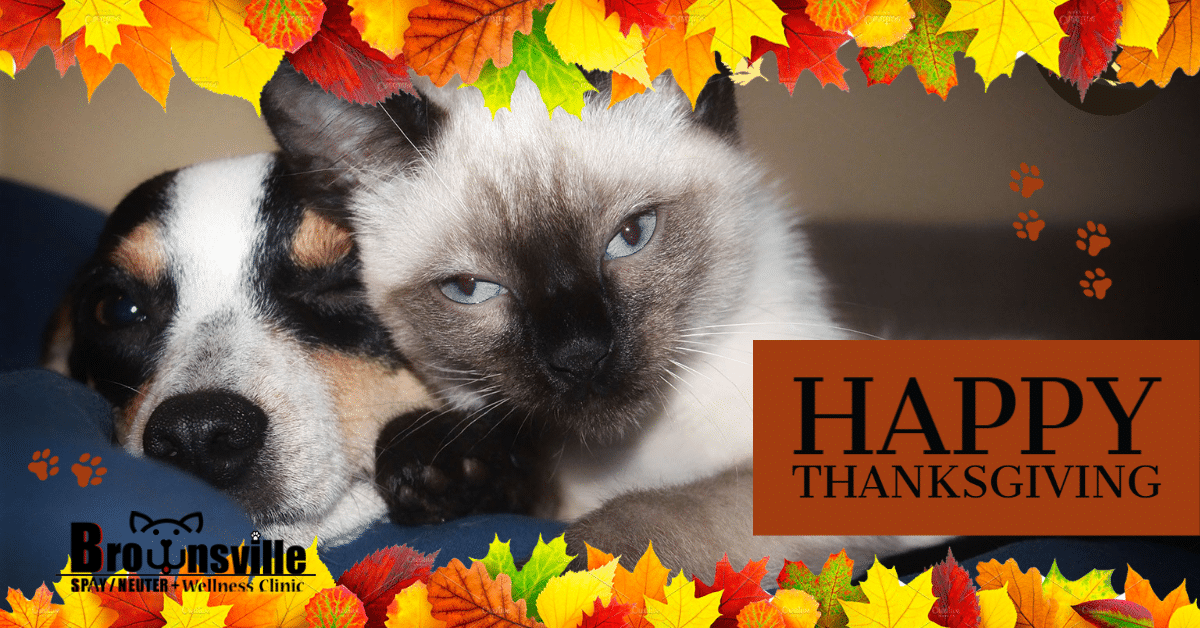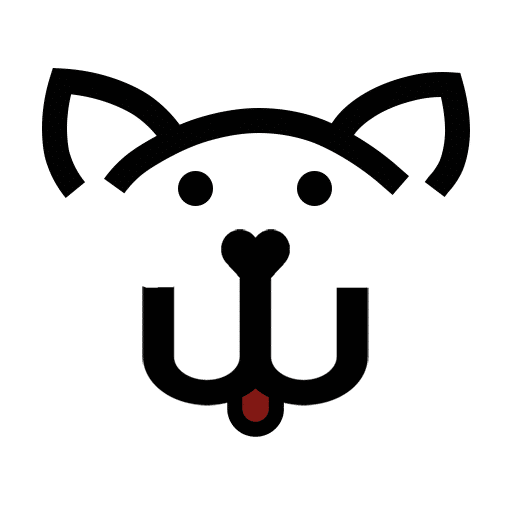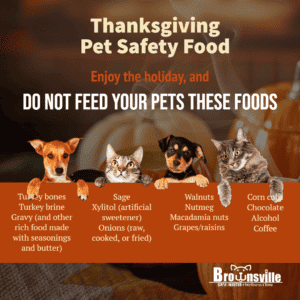
Thanksgiving is a special holiday that brings together family and friends, but it also can carry some hazards for pets.
Holiday food needs to be kept away from pets, and pet owners who travel need to either transport their pets safely or find safe accommodations for them at home. About 56 percent of our pet owners admitted to sharing Thanksgiving table scraps with their pets. While this can be a wonderful way to add lean protein and fresh veggies to your pet’s diet, there are also hidden dangers in holiday fare.
Brownsville Spay Neuter is sharing these safety tips to remind our pet owners to take proper precautions and make sure they are considering their pet’s safety when getting ready for and enjoying the holiday.
Food Safety
Ye's and No's for Pet Food on Thanksgiving
You can absolutely let your dog or cat have a feast of their own – just make sure you know what foods are safe for them to eat. As always, also don’t let your animal overindulge. Obesity can lead to several health problems, so treats shouldn’t constitute anymore than 10% of your pet’s diet
Precautions for parties
If you’re hosting a party or overnight visitor, plan ahead to keep your pets safe and make the experience less stressful for everyone.
- Visitors can upset your pets. Some pets are shy or excitable around new people or in crowds, and Thanksgiving often means many visitors at once and higher-than-usual noise and activity levels. If you know your dog or cat is nervous when people visit your home, put him/her in another room or a crate with a favorite toy. This will reduce the emotional stress on your pet and protect your guests from possible injury.
- Watch the exits. Even if your pets are comfortable around guests, make sure you watch them closely, especially when people are entering or leaving your home. While you’re welcoming hungry guests and collecting coats, a four-legged family member may make a break for it out the door and become lost.
- Identification tags and microchips reunite families. Make sure your pet has proper identification with your current contact information – particularly a microchip with up-to-date, registered information. That way, if they do sneak out, they’re more likely to be returned to you.
Call us at (956) 550-8366 to set you an appointment to microchip your pet or visit our website. - Watch your pets around festive decorations. Special holiday displays or candles are attractive to pets as well as people. Never leave a pet alone in an area with a lit candle; it could result in a fire. And pine cones, needles and other decorations can cause intestinal blockages or even perforate an animal’s intestine if eaten.
Poison risks
Overindulging in the family feast can be unhealthy for humans, but even worse for pets: Fatty foods are hard for animals to digest. Poultry bones can damage your pet’s digestive tract. And holiday sweets can contain ingredients that are poisonous to pets.
- Keep the feast on the table—not under it. Eating turkey or turkey skin – sometimes even a small amount – can cause a life-threatening condition in pets known as pancreatitis. Fatty foods are hard for animals to digest, and many foods that are healthy for people are poisonous to pets – including onions, raisins, and grapes.
- Yeast dough can cause problems for pets, including painful gas and potentially dangerous bloating.
- Put the trash away where your pets can’t find it. A turkey carcass sitting out on the carving table, or left in a trash container that is open or easily opened, could be deadly to your family pet. Dispose of turkey carcasses and bones – and anything used to wrap or tie the meat, such as strings, bags, and packaging – in a covered, tightly secured trash bag placed in a closed trash container outdoors (or behind a closed, locked door).
- Be careful with decorative plants. Don’t forget that some flowers and festive plants can be toxic to pets. These include amaryllis, Baby’s Breath, Sweet William, some ferns, hydrangeas, and more.
- If you notice any signs of toxicity or poisoning, please call their veterinary provider or ASPCA poison hotline.
Travel concerns
Whether you take your pets with you or leave them behind, take these precautions to safeguard them when traveling over the Thanksgiving holiday or at any other time of the year.
- If your pet needs a health certificate, call us and schedule an appointment to get the needed certificate within the timeframes required by those states.
Learn more about health certificates. - Never leave pets alone in vehicles, even for a short time, regardless of the weather.
- Pets should always be safely restrained in vehicles.
- Call for an appointment if you’re traveling by air and considering bringing your pet with you. Air travel can put pets at risk, especially short-nosed dogs. Brownsville Spay Neuter will be happy to advise you regarding your own pet’s ability to travel.
(*) The Thanksgiving Pet Safety Tips Blog is a compilation of information gathered from different websites, such as the American Veterinary Medical Association website. Brownsville Spay Neuter hopes that these tips will help the pet owners keep their animals close and safe during the Thanksgiving holiday.
Subscribe to our newsletter
We send e-mails once a month, we never send Spam!

